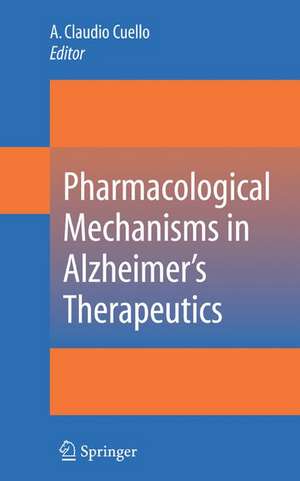Pharmacological Mechanisms in Alzheimer's Therapeutics
Editat de A. Claudio Cuelloen Limba Engleză Hardback – 30 oct 2007
| Toate formatele și edițiile | Preț | Express |
|---|---|---|
| Paperback (1) | 1096.62 lei 6-8 săpt. | |
| Springer – 28 oct 2010 | 1096.62 lei 6-8 săpt. | |
| Hardback (1) | 1101.94 lei 6-8 săpt. | |
| Springer – 30 oct 2007 | 1101.94 lei 6-8 săpt. |
Preț: 1101.94 lei
Preț vechi: 1159.94 lei
-5% Nou
Puncte Express: 1653
Preț estimativ în valută:
210.85€ • 220.17$ • 174.12£
210.85€ • 220.17$ • 174.12£
Carte tipărită la comandă
Livrare economică 15-29 aprilie
Preluare comenzi: 021 569.72.76
Specificații
ISBN-13: 9780387715216
ISBN-10: 0387715215
Pagini: 319
Ilustrații: XX, 324 p. 35 illus.
Dimensiuni: 155 x 235 x 21 mm
Greutate: 0.61 kg
Ediția:2007
Editura: Springer
Colecția Springer
Locul publicării:New York, NY, United States
ISBN-10: 0387715215
Pagini: 319
Ilustrații: XX, 324 p. 35 illus.
Dimensiuni: 155 x 235 x 21 mm
Greutate: 0.61 kg
Ediția:2007
Editura: Springer
Colecția Springer
Locul publicării:New York, NY, United States
Public țintă
ResearchDescriere
Alzheimer’s disease is a serious health concern in developed countries where the population is progressively aging. At the personal level the diagnosis of the disease represents a devastating scenario for both the sufferer and care givers. In recent years medications have been developed that mitigate somewhat the symptoms and delay, for a while, the progression of the disease. It is expected that in the coming years new medications will be developed that are capable of halting the chain of pathological events and symptoms of the disease. This book covers a wide range of the pharmacological mechanism underlying present and potential new therapies. The recent extraordinary advances in our understanding of the cell and molecular biology of Alzheimer’s disease allows for an optimistic forecast of innovative therapies.
This book will be of value to a wide audience interested in cellular and molecular mechanisms leading to the pathology of Alzheimer’s disease and on the multiple, possible, therapeutic opportunities ahead of us. The field of research is enormous and therefore therapeutic targets that have been selected for this volume seem the most hopeful and for which there is a solid rationale. There are a number of emerging therapeutic targets, such as the inactivation/removal of Aß peptides, amongst others, which might have potential applications if specific leading compounds were to be identified.
This book will be of value to a wide audience interested in cellular and molecular mechanisms leading to the pathology of Alzheimer’s disease and on the multiple, possible, therapeutic opportunities ahead of us. The field of research is enormous and therefore therapeutic targets that have been selected for this volume seem the most hopeful and for which there is a solid rationale. There are a number of emerging therapeutic targets, such as the inactivation/removal of Aß peptides, amongst others, which might have potential applications if specific leading compounds were to be identified.
Cuprins
Overview of the Alzheimer's Disease Pathology and Potential Therapeutic Targets.- Trial Designs and Outcomes to Monitor Novel Therapeutics in Alzheimer's Disease.- The Pharmacological Treatment of Alzheimer's Disease with Cholinesterase Inhibitors and Memantine.- M1 Muscarinic Agonists: A Comprehensive Therapy Against Major Hallmarks of Alzheimer's Disease.- Cholinergic Neurodegeneration in Alzheimer's Disease: Basis for Nerve Growth Factor Therapy.- The Rationale for Glutamatergic Therapy in Alzheimer's Disease.- Secretases as Pharmacological Targets in Alzheimer's Disease.- ?-Secretase as a Target for Alzheimer's Disease.- The Rationale for an Immunological Approach to Alzheimer's Therapeutics.- Neuroinflammation, Alzheimer Disease, and Other Aging Disorders.- Nonsteroidal Anti-inflammatory Drugs (NSAIDs) and Derived A?42-Lowering Molecules for Treatment and Prevention of Alzheimer's Disease (AD).- The Potential Application of Antioxidant Agents in Alzheimer Disease Therapeutics.- Apolipoprotein E: A Potent Gene-Based Therapeutic Target for the Treatment of Sporadic Alzheimer's Disease.- Tau Pathology as a Target in Alzheimer's Therapeutics.- Design of Inhibitors of Amyloid-? Misfolding and Aggregation for Alzheimer's Therapy.- Potential Applications of Glycosaminoglycan-Related Compounds in Alzheimer's Disease.- Multifunctional Neuroprotective Drugs for the Treatment of Alzheimer's Disease.- Interpreting Clinical Studies of Putative Therapeutics for Alzheimer's Disease: The Case of Statins and NSAIDs.
Textul de pe ultima copertă
Alzheimer’s is the most common dementia in the elderly. The need for effective therapy of dementia is greater than ever, but there is not, as yet, a drug therapy which can stop or reverse the clinical consequences. There is, however, a great deal of anticipation on the imminent development of effective, disease-modifying therapies. The remarkable progress made by the scientific community in unraveling molecular and cellular aspects of the Alzheimer’s pathology has allowed the identification of a number of promising targets for drug development. Investigation of these targets and the evolution of ongoing strategies to develop efficacious therapies for this devastating neurodegenerative condition is the central theme of Pharmacological Mechanisms in Alzheimer’s Therapeutics. The current and future therapies based on this new knowledge of the Alzheimer’s pathology are dealt with by contributors who have been most influential in bringing this new knowledge and in the development of experimental and presently applied therapies. The book should be of interest to medical professionals and basic scientists alike since it provides ideas about current trends in Alzheimer’s therapeutics to the general public.
Caracteristici
Covers a wide range of the pharmacological mechanism underlying present and potential new therapies
The recent extraordinary advances in our understanding of the cell and molecular biology of Alzheimer’s disease allows for an optimistic forecast of innovative therapies
Includes supplementary material: sn.pub/extras
The recent extraordinary advances in our understanding of the cell and molecular biology of Alzheimer’s disease allows for an optimistic forecast of innovative therapies
Includes supplementary material: sn.pub/extras




